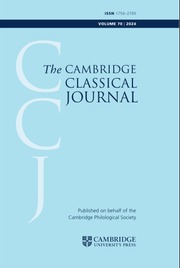Article contents
C. Asinius Pollio and the Eclogues1
Published online by Cambridge University Press: 28 February 2013
Extract
The Eclogues are universally regarded as a highly structured literary artefact, and some scholars believe that Virgil's summa manus modified the contents of individual poems at the book's final stage to achieve balance and symmetry. Whether or not such modification took place, the pattern of addressees/honorands in the collection – where they exist – ought to have some significance. The following table sets them out:
1. deus (7) = iuuenem (42), usually identified as Octavian
2. None
3. C. Asinius Pollio (84–9)
4. C. Asinius Pollio (esp. 11–14)
5. None
6. P. Alfenus Varus (6–7); C. Cornelius Gallus (64–73)
7. None
8. tu (6–13), often identified as C. Asinius Pollio, but by some as Octavian
9. P. Alfenus Varus (26–9); L. Varius Rufus and C. Helvius Cinna (35–6); (?)‘Caesar’ (cf. Dionaei … Caesaris astrum, 47–9)
10. C. Cornelius Gallus (passim)
- Type
- Research Article
- Information
- Copyright
- Copyright © The Author(s). Published online by Cambridge University Press 2008
References
WORKS CITED
- 1
- Cited by


